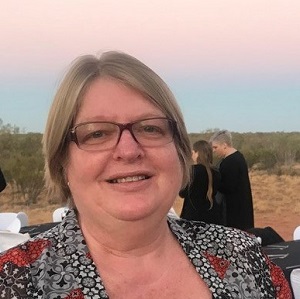Lee Scott
What were your UNE Qualifications?
In 1988 I started at UNE with an Associate Diploma in Local and Applied History. This was with John Ferry, who was very inspiring. During the residential for this course I purchased a house in Uralla and moved my family to the New England from the Blue Mountains. Immediately after this qualification I started a bachelor’s degree in Archaeology and Palaeoanthropology. This was followed by a Masters in Heritage Archaeology. I have also done business studies at UNE, for which I received a golden key, however, after ¾ of a degree I decided that it was the humanities that really held my interest and I reverted to Archaeology.
I also have postgraduate qualifications in Museum Studies from Deakin.
Online or on-campus study?
In my day it was called external. Most of my study was done that way, although I did the business studies in 1999 on-campus.
What was your reason for studying at UNE?
I started study at UNE because they offered the type of subjects that I was interested in, and once I moved of course it was my local university so just kept studying there. No, really, I had developed some excellent networks with the faculty, who were highly respected archaeologists.
How was your experience with UNE Lecturers?
I formed great relationships with a number of my lecturers. This led to some great opportunities. I did some work for Pam Watson in preparing the project plans for the UNE student dig based at the old post office in Rocky River, following on from my master’s thesis. Ian Davison’s assistance helped me secure some contract work developing Conservation Management Plans for some of the UNE historic buildings and sites and I have done some subsequent work with Janis Wilton.
Your current job?
I am the National Operations Manager for the Australian Museums and Galleries Association (AMaGA) based in Canberra but with branches around Australia and offices in Victoria and Western Australia. The position, while mostly administration, has enough museum and gallery sector projects and content to keep me interested and utilise all of my qualifications and previous experience.
The personal qualities needed to do your job?
Working for not-for-profit is fulfilling, however, our sector is under-resourced so we have to be committed to the sector and be versatile, creative and flexible enough to get the job done with what resources that are available.
If you weren’t in this line of work, what do you think you’d be doing instead?
I am a very crafty person, in fact I teach craft courses for the Canberra Institute of Technology short course program. I am also very interested in ethically produced craft supplies and products that provide the makers, generally women, with a living wage. I would like to promote ethical crafting and the health and wellbeing benefits of mindful crafting.
The biggest challenge and biggest achievement you’ve experienced?
As far as work is concerned AMaGA has been working for a number of years on a project that is committed to improving Indigenous engagement and employment in the museums and galleries sector. The project developed a ten-year roadmap, First Peoples: a roadmap for enhancing indigenous engagement in museums and galleries, which we are now committed to implementing. It is a great achievement for those working on the project and for the sector, however, it will be on ongoing challenge to implement the recommendations and make real and permanent changes.
How have your UNE qualifications aided you in your career?
It was my mix of humanities and business qualifications, along with my experience in both administration and volunteer museum work that secured me the position. The knowledge gained during my studies at UNE has given me insights and perspectives that I have been able to bring to my position.
What inspires you inside work and outside work?
It is difficult to pick one thing that inspires me, I love to travel, and work has taken me to some great places around Australia and overseas. I find David Attenborough very inspiring along with other environmental activists like David Suzuki, they have helped me to think about the way I live and to make positive changes. I find peace and tranquillity in working on a complicated knitting pattern in a beautiful yarn sitting overlooking a spectacular ocean or mountain view, or even amongst the plants in my garden.
Do you volunteer your time?
Working full time and teaching evenings and weekends keeps me very busy. I do however miss my museum volunteering and would very much like to take it up again as I transition to retirement.
Any plans for future study with UNE?
Probably not at this stage, although a PHD is something that I often give some thought to.

